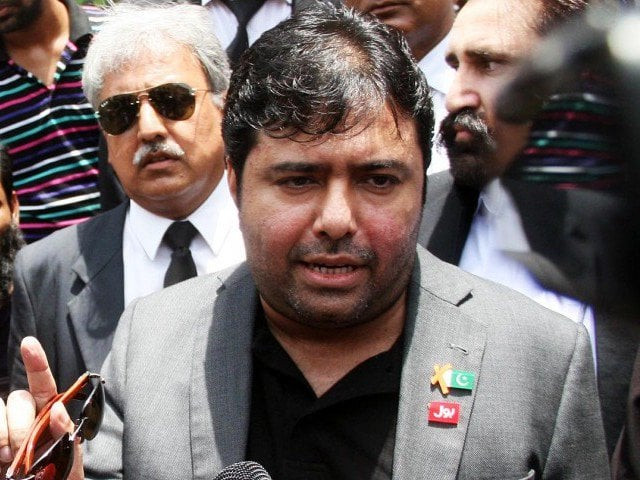Axact CEO Shoaib Sheikh arrested from outside SHC
Sheikh will be produced before a trial court tomorrow; case to be disposed off within three months

Axact CEO Shoaib Ahmed Sheikh talks to media outside the Sindh High Court on Monday, May 25, 2016. PHOTO: ONLINE
FIA personnel took the IT company’s head into custody from outside the SHC building where he spent hours in an attempt to get a pre-arrest bail after a two-judge bench annulled his acquittal.
The bench, comprising Justice Naimatullah Phulpoto and Justice Shamsuddin Abbasi, set aside the order passed by the District and Sessions Judge-V, Karachi on August 24, 2016, that acquitted Sheikh.
Allowing the appeal filed by the federal government through the FIA against Sheikh’s acquittal, the bench directed the trial court to hear the case afresh and decide the same within three months.
Sheikh and co-accused were told to appear before the trial court on March 3, when fresh trial will begin.
SHC warns Axact chief over no-show
The Axact CEO was accused of having illegally transferred Rs170.17 million to a Dubai-based firm, Chanda Exchange Company, in April 2014. Chanda Exchange Company’s directors – Mohammad Younis and Mohammad Junaid – were named co-accused in the case, which was registered under Foreign Exchange Regulation Act, 1947 with First-Information Report (FIR) 51/15.
Arguing on behalf of the federal government on Monday, Additional Attorney General Salman Talibuddin said that Shaikh exercised the authority to operate Axact’s bank accounts and to run its offices.
An amount of Rs170 million was drawn from the bank accounts of the company through 116 cheques. No one questioned from where Rs170 million were earned and where the same was spent, he said, adding that Axact’s employees had testified that these bank accounts were operated on the directives of the accused.
The additional attorney-general told the court that the accused persons had sold fake degrees all over the world and stashed money in foreign bank accounts operated from Dubai.
Challenging the merits of Axact CEO Shoaib Ahmed Shaikh’s acquittal order, the federal law officer argued that the trial court had not passed the order on merit. He admitted that the prosecution’s witnesses were available, but the charge could not be framed against the accused persons.
Defence lawyer Shaukat Hayat contended that the additional attorney general was making arguments in relation to fake degrees instead of the matter at hand that was related to money-laundering.
He argued that the case relating to fraud and forgery was pending before the district and sessions court. He further argued that in no case, it had been established that the Axact CEO was involved in the sale of fake degrees.
Hayat argued that there was no evidence to establish that the illegal method of transferring money called ‘Hawala’ was adopted in making transactions through 116 cheques. The prosecution failed to mention a single date when the alleged illegal transfers were made, he added.
Hayat argued that the trial court had thoroughly examined the entire evidence brought by the FIA on record. In its appeal, the FIA had not mentioned as to what evidence the trial court had not considered, he added.
After hearing arguments from the additional attorney-general and the defence lawyer, the SHC allowed FIA’s appeal, setting aside the acquittal of the Axact CEO and others.
Following nullification of his acquittal, Shaikh tried to leave the court, but returned as FIA officials were present outside the court building to arrest him since he had not obtained a pre-arrest bail.
His lawyer moved an application seeking grant of three-day protective bail to his client to avoid his arrest.
On his request, SHC Chief Justice Ahmed Ali M Sheikh constituted a single bench, headed by Justice Phulpoto, to hear the bail plea. However, the judge after hearing arguments rejected the plea. Finding no other alternate legal remedy, Shaikh on the advice of his lawyers surrendered to the FIA staff.
In 2015 New York Times investigation into fake degrees alleged that Axact was making hundreds of millions of dollars selling phoney academic credentials to thousands of people around the world.
The NYT report and subsequent FIA investigations said that Axact used a series of shell companies to manage its illegal affairs, including the webpages for dozens of non-existent universities, high schools, and accreditation bodies, banking affairs, and possible money laundering. The company was also accused of extortion, the claims that were repeated in 2018 stories appearing in the BBC and Gulf News.
Former FBI agent Allen Ezell told the BBC that Axact had continued to launch new online universities and was also involved in extortion and blackmail.
Approximately 2.1 million blank bogus degrees and certificates of universities and schools were recovered from the administrative process management department of Axact in Karachi, which took 15 days just to count. These details were included in the challan submitted to the courts.



















COMMENTS
Comments are moderated and generally will be posted if they are on-topic and not abusive.
For more information, please see our Comments FAQ